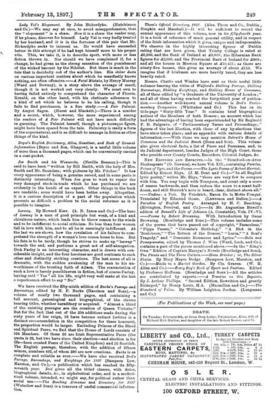Leeway. By Howard Kerr. (A. D. lanes and Co.)—The hero
of Leeway is a man of good principle but weak, of a kind and chivalrous nature, which leads him to throw reason to the winds and to be indifferent to social criticism. No less than four women fall in love with him, and to all he is seemingly indifferent. At the last we are shown how the revelation of his failure to com- prehend the strength of a woman's love comes home to him. But his fate is to be tardy, though he strives to make up " leeway " towards the end, and performs a great act of self-abnegation. Dick Farley is an interesting character, and is drawn with con- siderable insight, and the four heroines are good contrasts to each other and distinctly striking creations. The last scene of all is dramatic, with the sudden awakening of the man to his un- worthiness of the trusting faith of Aileen. The renunciation of such a love is barely possible even in fiction, but of course Farley, having said " Yes " all his life, might very well make at the last a superhuman effort to say "No."
We have received the fifty-ninth edition of Burke's Peerage and Baronetage, edited by H. F. Burke (Harrison and Sons),—a volume of nearly two thousand pages, and containing a full account, genealogical and biographical, of the classes bearing titles, whether hereditary or acquired. "Almost a third of the existing peerages are the creation of Queen Victoria." But for the fact that out of the 294 additions made during the sixty years of her reign, 58 have become extinct (orbitas is a distinct recommendation in the competition for these honours), the proportion would be larger. Excluding Princes of the Blood and Spiritual Peers, we find that the House of Lords consists of 534 Members. Of these 26 are Irish Representative Peers (the quota is 28, but two have since their election—and election is for life—been created Peers of the United Kingdom) and 16 Scottish. The English peerage, therefore, with the addition of fifteen minors, numbers 492, of whom 236 are new creations. Burke is as complete and reliable as ever.—We have also received Dod's Peerage, Baronetage, and Knightage for 1897 (Sampson Low, Marston, and Co.),—a publication which has reached its fifty- seventh year. Dod gives all the titled classes, with dates, biographical details, &.c., in alphabetical order, and is a modest- sized volume, intended, we might say, for political rather than social use.—The Banking Almanac and Directory for 1597 (Waterlow and Sons) is a treasure of useful commercial informa-


































 Previous page
Previous page